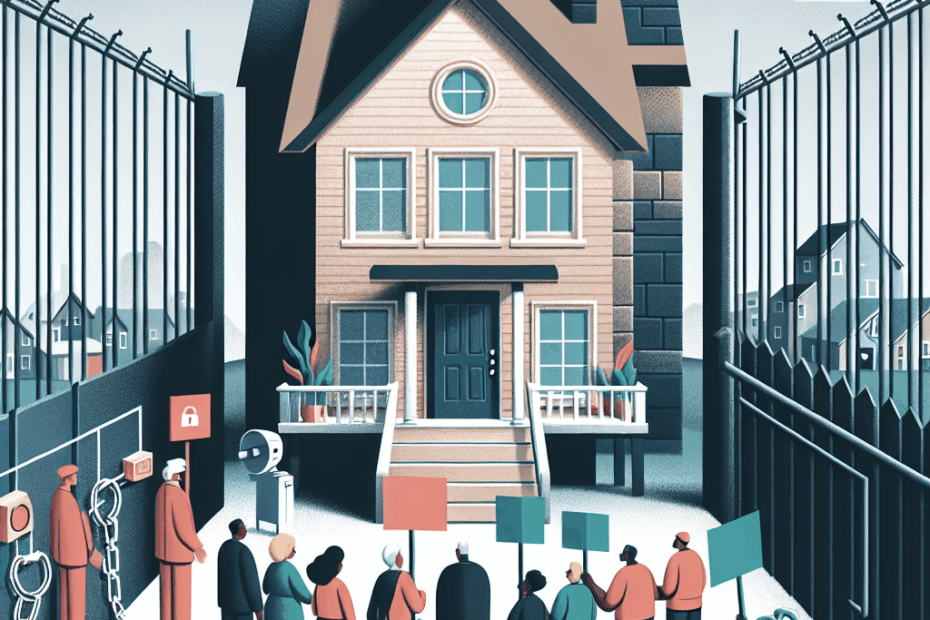Why Isn’t Housing a Bigger Deal? Let’s Find Out!
Hey everyone, John here! Today, we’re diving into something that affects pretty much everyone: housing. The original article is asking a simple question: why isn’t making sure everyone has a decent place to live a HUGE deal in politics? It’s a great question, and we’re going to break it down nice and easy.
The Problem: Housing Costs Are Climbing
The main problem is pretty straightforward: housing is getting expensive. Think about it – rent, mortgages, the whole shebang. For many people, a big chunk of their paycheck goes straight into paying for a roof over their heads. When housing costs go up, it squeezes people’s budgets. You have less money left over for everything else, like food, fun, or even saving for the future.
Lila, my awesome assistant, has a question:
Lila: “John, what exactly does ‘mortgage’ mean?”
John: “Great question, Lila! A mortgage is basically a loan you take out from a bank or lender to buy a house. You pay it back over a long time, like 15 or 30 years, with interest. It’s how most people afford to own a home.”
Why Doesn’t Everyone Care About Housing?
So, if high housing costs are such a problem, why isn’t it a bigger topic of conversation and a top priority for politicians? The article explores this question, and it’s not as simple as you might think. Here are a few reasons:
- It’s a Local Issue: While the problem is big, the solutions are often local. Zoning laws (rules about what can be built where) and other regulations are made by cities and towns, not the federal government. This means there’s no one single solution.
- Different Priorities: Politicians have a lot on their plates. They have to deal with healthcare, education, the economy, and international relations. Housing sometimes gets lost in the shuffle, especially when other issues feel more urgent.
- Who Benefits? Building more housing can be complicated. Developers (the people who build houses) might not always want to build affordable housing, and some existing homeowners may worry about their property values if more houses are built nearby.
- It’s Complex: The housing market has lots of moving parts. It’s affected by interest rates (the cost of borrowing money), construction costs, and the overall economy. It’s not always easy to understand, let alone fix.
The Impact on You (and Everyone Else!)
The article also touches on how these housing issues affect you and me. Rising housing costs can lead to:
- Less Financial Freedom: As mentioned earlier, less money for everything else.
- Increased Stress: Worrying about paying rent or a mortgage can be super stressful.
- Difficulty Saving: It’s harder to save for retirement, a down payment on a house, or other goals.
- Inequality: Housing costs can make the gap between rich and poor even wider. Those who can afford housing have a big advantage.
What Can Be Done? (And Who Should Do It?)
So, what’s the answer? What can be done to address the housing issue? Well, there’s no magic bullet, but here are a few ideas the article suggests:
- Build More Housing: This seems simple, but it’s crucial. More houses mean more choices and potentially lower prices.
- Change Zoning Laws: Allow for different types of housing in more areas, like apartments, townhouses, and smaller homes.
- Offer Incentives: Encourage developers to build affordable housing through tax breaks or other programs.
- Increase Homeownership: Government can make it easier for people to own their own homes.
The question of “who” should do all of this is a big one. It will require a combination of government action, from local, to state, and the federal levels, as well as the private sector (developers and builders).
Lila, curious as ever, chimes in:
Lila: “John, what are zoning laws?”
John: “Okay, Lila. Zoning laws are basically rules that tell you what you can build and where. For example, some areas might only allow single-family homes, while others might allow apartments or businesses. These laws can really impact the cost of housing.”
The Bigger Picture: It’s About the Economy, Too!
The article also brings up that housing affects the entire economy. When people have to spend so much on housing, they have less money to spend on other things, like shopping, dining out, and entertainment. This can slow down economic growth and affect businesses. In other words, housing is intertwined with the overall health of the economy.
My Two Cents (and Lila’s First Thoughts!)
This article highlights a complex problem that is affecting so many of us. It’s easy to see why housing is so important. We all need a place to live, and when that becomes too expensive, it has a domino effect. It’s something we should definitely pay attention to.
Lila’s Perspective: “Wow, it’s kind of scary to think about how expensive housing is! I hope it gets better so more people can have safe and affordable places to live. I didn’t realize how much the laws affected the cost of houses. It’s all pretty complex, but now it’s starting to make sense.”
For me, I think it’s important that we all advocate for change. Voting for people who prioritize housing is a good start. Also, supporting policies that address the issues is key. It’s time we stop ignoring this important subject. Housing is a basic need, and a just society needs a fair plan.
This article is based on the following original source, summarized from the author’s perspective:
When Does Housing Become THE Issue?
